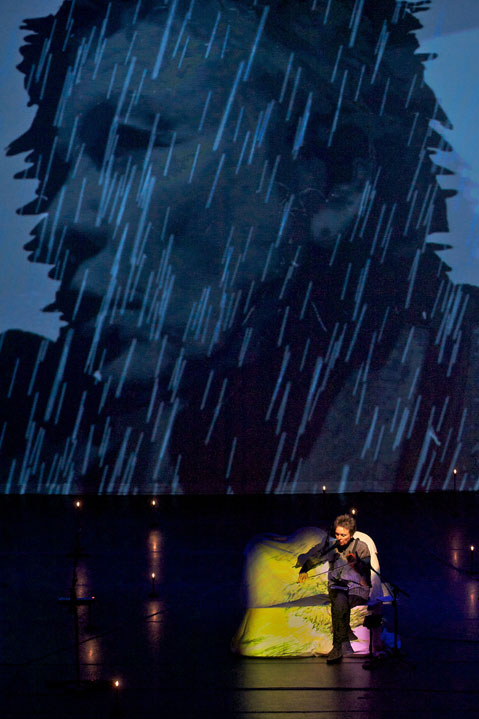Laurie Anderson Returns to UCSB
UCSB Arts & Lectures Presents Delusion
It was 30 years ago that an odd piece of vinyl called “O Superman” crashed the new wave airwaves in England and made Laurie Anderson into something that hadn’t really been seen before—a performance art celebrity. Singing through a vocoder to the backing of her own voice, Anderson unwound a collage-like lyric that began with the lines “O superman. O judge. O Mom and Dad. Mom and Dad.” From there, the piece cantered through a mélange of found dialogue and poetry, all filtered through the warmly mechanical instrument that is Anderson’s electronically altered voice. One thread, however, runs through the whole eight minutes and 21 seconds of “O Superman,” and that’s the figure of the mother. She’s the one who leaves a message on the artist’s answering machine, and she’s the one who’s there at the end, as the song concludes with lines beginning “So hold me, Mom, in your long arms.”

Anderson, who has gone on to record and perform dozens of other memorable pieces as part of her untouchable performance-art career, will be at Campbell Hall this Tuesday with her latest production, Delusion, which was originally created as part of the cultural events surrounding the 2010 Winter Olympics in Vancouver. Anderson’s mom, who died recently, is very much a part of this new work, as are Anderson’s dreams. I spoke with her last week by phone from her home in New York City.
Is Delusion the same now as it was when you premiered it in Vancouver? It’s changed a lot since I began doing it in Canada.
Does the word “delusion” have a negative connotation for you? I don’t know, not really. I accept that it’s a state that you live in for a lot of your life. For me, the main delusion is that we don’t believe that we will die, that somehow even though it’s inevitable, it won’t happen to us. That’s the big delusion—life without death.
I understand that the piece is based in part on your dreams, is that correct? Yes, but you know any artist will say, “Oh yes, I use my dreams in my work,” but that’s not really what I mean. I’m not mining my dreams for material to make art. But I do believe that you can become aware of how your mind works that way—by observing your dreams.
Another big theme is that of your mother’s passing. How do they relate? With my mother’s death, my dreams became a place where she was still there. You know these dead, they hang around. So I was dreaming about my mother; she was in my dreams. And then what happens is the stuff in your dreams tends to drift into your waking life. But let me be clear about something; I don’t believe that dead people can talk to you.
One night, when the piece was still in its early phases, I got a note delivered to me backstage. There was a woman in the audience, and she had written to me that she was psychic and that my mother was “there last night” and “she’s trying to contact you!” And I just thought, you know, that’s it, I’ve let in the crazies with this—the people who see spirits and imagine them as kind of floating around all the time are going to be coming to the show.
Is that the case? Do you attract a lot of psychics now? Actually it hasn’t been a problem—it was really just that one night. The thing with this subject is that everyone is right about it, and yet no one can prove it. Anyway, I’ve always been more interested in language than in ghosts. Language seems more amazing to me. I feel that through language, I am a god and I can change the world. I can take a terrible day and describe it in such a way that recalling it is beautiful. That’s magical.
4•1•1
Laurie Anderson presents Delusion at UCSB’s Campbell Hall on Tuesday, October 19, at 8 p.m. For tickets and information, call 893-3535 or visit artsandlectures.sa.ucsb.edu.



